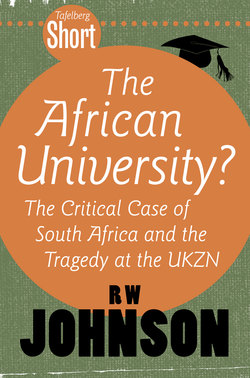Читать книгу Tafelberg Short: The African University? - RW Johnson - Страница 4
На сайте Литреса книга снята с продажи.
The fall of the African university
ОглавлениеThere then followed a period which can only be called an age of regression. In many cases dictators and warlords who would not have been out of place in feudal Europe simply laid waste to all around them, universities included. Makerere had no chance against the depredations of Milton Obote, let alone Idi Amin; the University of Addis Ababa – founded only in 1950, despite Ethiopia's ancient independence – had similarly little chance against Mengistu. Liberia, independent since 1847, had no university until 1951, and that too had little chance against first Samuel Doe and then Charles Taylor. Over 90% of university facilities were pillaged, more than three-quarters of the two-million-book library was destroyed, and the number of staff fell by 80%. A similar fate met the University of Sierra Leone in the civil war of the 1990s there. We are not talking here of the freezes and squeezes common in Western universities but of burning, looting and mass murder.
Amazingly, the University of Bangui in the Central African Republic somehow survived the reign of Jean-Bedel Bokassa, who would beat offending schoolchildren to death himself and sometimes eat them. Similarly, Lovanium split into three but somehow survived Mobutu. It even acquired a second nuclear reactor though there was acute international concern over security matters there, as well there might be, with academic salaries down to $15 a month and facilities getting looted and sold off as a result.
But it is important to realise that the one-party regimes of Nyerere, Kaunda and countless others were equally inimical to academic freedom, university autonomy and all the other conditions for the growth of a healthy higher education sector. In Nigeria the universities were all but wiped out by high inflation and collapsing university income and academic salaries, which saw virtually all top- level academics leave for other shores. If one puts together such disasters with feudal monsters and one-party ideologues, a great deal of the African continent in the 1960s-1980s is covered.
Essentially, the conditions for proper university life – which must always include a dissenting academy – simply did not exist throughout most of the continent in that period. The fact that several South African universities actually improved through this period – the 1980s are now seen as a golden age in campus terms – merely illustrates the peculiar contradictions of the colonial period, both reactionary and yet also progressive in a sense that Marx would recognise.
